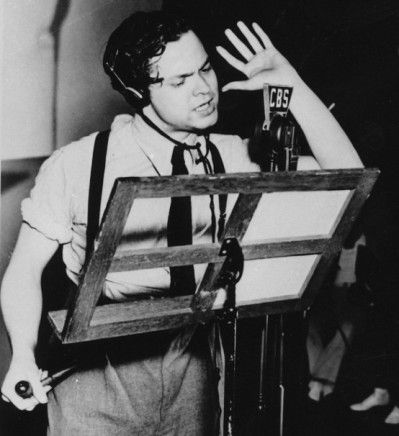On April 11, 1937, the Columbia Broadcasting System (today known as CBS) aired a 30-minute radio play written in verse by the American poet Archibald MacLeish called The Fall of the City. It was produced as part of the Columbia Workshop radio series and features performances by Orson Welles, Burgess Meredith, and Adeline Kline as well as music composed and directed by Bernard Hermann. Very few programs were broadcast nationwide in those days, but CBS made an exception for this unique production.
At the time The Fall of the City was written, Fascism was spreading across Europe. The Anschluss, the Nazis’ invasion of Austria, had not yet occurred but seemed imminent. MacLeish intended his play as an allegory on the rise of Fascism. He said the play was about “the way people lose their freedom” and also called the play, in part, a response to the America First movement of the 1930s. In The Fall of the City, the people of the city willingly surrender their freedom to a tyrant.
Though the city where the action takes place goes unnamed in the play, it was modeled after the city of Tenochtitlán, where, according to legend, a woman once rose from the dead to alert the city of the advancement of an enemy army, which is exactly what happens in The Fall of the City
. However, in MacLeish’s world, this strange and ominous event is covered by international press and broadcast over the radio. The conceit of the play is that it is a breaking news story unfolding live as listeners tune into their radios. All of the action occurs in real time in a single location. MacLeish uses the radio announcer (played by Welles) as his narrator, a kind of Greek chorus. Much of the play consists of the people debating how they should respond to the coming event. When the conqueror finally arrives, the people surrender to hysteria and let him take the city unopposed. “Order must master us!” they proclaim; “Men must be ruled!” Only the announcer is able to see that, when the conqueror’s visor rises, his helmet is hollow inside: no one is there at all. The epiphany of the play belongs to him:
The people invent their oppressors: they wish to believe in them.
They wish to be free of their freedom: released from their liberty—
The long labor of liberty ended!
They lie there!
The first airing of the play was so successful that it was aired again two weeks later. Although broadcasters were not as efficient in the 1930s in measuring audiences as they are today, CBS concluded that MacLeish’s words were heard by over a million people, a feat that was very impressive for the time. The play was a great success with audiences, but it also succeeded as prophecy. About a year after the first airing, Hitler conquered Austria with barely a shot being fired.
You can listen to the original broadcast of the play through the video embedded below.
In 2009, WNYC produced a radio documentary on the 1937 production, which you can find through the link below.


